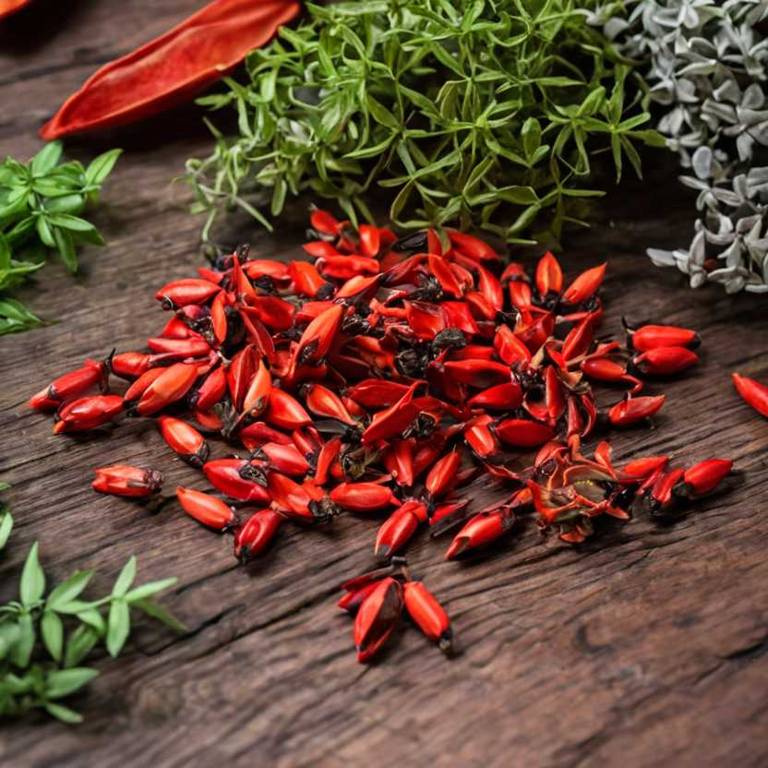Variegated Erythrina (Erythrina variegata)
Variegated Erythrina (Erythrina variegata) is a member of the Fabaceae family, native to Southeast Asia, Indian Subcontinent, and Pacific Islands. Traditionally, its leaves, bark, and seeds have been used for decoctions, infusions, and powders.
This herb is particularly valued for its anti-inflammatory, astringent, and tonic actions, and has a long history of use in ayurvedic medicine, african traditional medicine, and traditional chinese medicine.

Quick Facts / Key Information
| Common Name | Variegated Erythrina |
|---|---|
| Scientific Name | Erythrina variegata |
| Plant Family | Fabaceae |
| Genus | Erythrina |
| Species | variegata |
| Native Range | Southeast Asia, Indian Subcontinent, Pacific Islands |
| Plant Parts Used | Leaves, Bark, Seeds |
| Primary Medicinal Actions | Anti-Inflammatory, Astringent, Tonic |
| Primary Traditional Systems | Ayurvedic Medicine, African Traditional Medicine, Traditional Chinese Medicine |
| Historical Preparation Methods | Decoction, Infusion, Powder |
Botanical Identity
- Scientific Name
- Erythrina variegata
- Common Name
- Variegated Erythrina
- Synonyms / Alternative Names
- Rain Tree, Coral Tree, Coral Tree
- Plant Family
- Fabaceae
- Genus
- Erythrina
Botanical Description
- Growth Habit
- Perennial herbaceous plant.
- Height
- It typically reaches a height of 5 to 15 meters.
- Leaves
- Broad leaves with upper surface exhibiting a glossy green and lower surface displaying a pale white to silvery hue, featuring distinct stomatal bands along the midrib.
- Flowers
- Inflorescences are racemose with zygomorphic flowers having five petals, one of which is larger and colored red, with two smaller white petals and two yellow stamens.
- Stems
- Elongated, erect growth habit, opposite branching pattern, smooth, glabrous surface, prominently ridged and chambered structure.
Traditional Uses / Historical Use
Traditional Systems
- Ayurvedic Medicine
- African Traditional Medicine
- Traditional Chinese Medicine
Historical Preparation Methods
- Decoction
- Infusion
- Powder
- Poultice
Medicinal Actions
- Anti-inflammatory
- In herbal texts, considered a cooling anti-inflammatory, for general calming applications.
- Astringent
- Commonly referenced as a mild astringent, for surface-level applications.
- Tonic
- Traditionally described as a warming tonic, for long-term use contexts.
- Diuretic
- In herbal literature, noted as a moderate diuretic, for elimination-focused applications.
Active Compounds
- Flavonoid
- A group of naturally occurring compounds commonly present in many flowering plants.
- Alkaloid
- Plant-derived nitrogenous compounds found in various tissues.
- Tannin
- Plant-derived compounds known for their ability to bind proteins.
- Phenolic Acid
- Simple phenolic molecules widely distributed across plant tissues.
Modern Research Overview
Scientific research related to this plant is ongoing. This section will be expanded in the future to include summaries of phytochemical studies, laboratory research, and other relevant scientific literature as it becomes available.
Safety & Contraindications
- General Precautions
- Precautionary considerations have been reported in relation to this herb.
- Contraindications
- Reported information suggests that this herb may be contraindicated in specific circumstances.
- Allergies
- Sensitivity or allergy-related effects have not been clearly established.
- Drug Interactions
- There is insufficient evidence to determine whether this herb interacts with pharmaceutical drugs.
- Toxicity
- Toxicity related to this herb has been documented in available sources.
- Pregnancy & Breastfeeding
- Available information regarding use during pregnancy or breastfeeding is limited.
Preparation & Usage Methods
- Infusion
- Water is poured over plant material and allowed to steep before straining.
- Decoction
- Plant parts are gently boiled in water to release soluble constituents.
- Poultice
- This method uses direct contact between plant material and the skin.
- Powder
- Dried plant material is ground into a fine powder.
- Extract
- This method isolates plant compounds using alternative solvents.
Growing, Harvesting & Storage
Growing / Cultivation
- Soil
- Prefers loamy soil with well-drained conditions. Typically grows best in organically rich soils.
- Sunlight
- Thrives in full sun. Tolerates full sun to partial shade.
- Watering
- Prefers well-balanced moisture levels. Tolerates periodic dry conditions.
Medical Disclaimer
The information provided on this page is for educational and informational purposes only. It is not intended to diagnose, treat, cure, or prevent any medical condition. Always consult a qualified healthcare professional before using any herb for medicinal purposes.